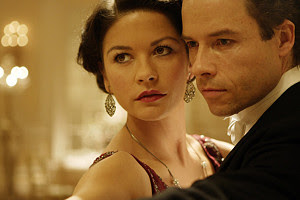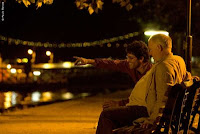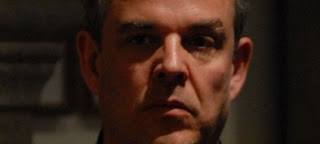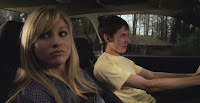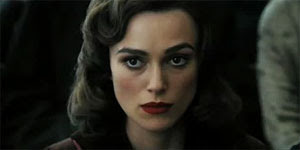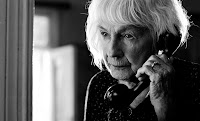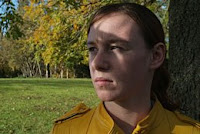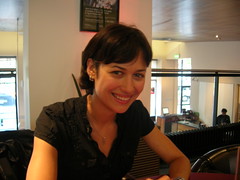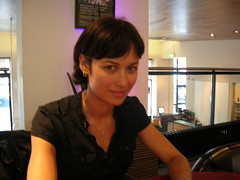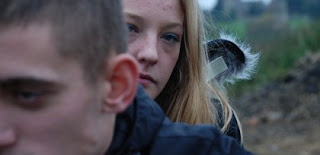
Featured review of the day: Better Things.
Black Balloon
Australian coming-of-age drama about a teenage boy growing up with a severely autistic older brother.
 Hugely enjoyable coming of age drama, loosely based on writer-director Elissa Down's own experiences of growing up with an autistic brother. Set in a perpetually sunny Australian suburb, the film stars Rhys Wakefield as Thomas, a blonde teenager who's beginning to resent his highly autistic older brother Charlie (Luke Ford), especially now that he's dealing with his first crush (Australian supermodel Gemma Ward as Jackie). Worse, Charlie's parents (Toni Collette and Erik Thomson as Maggie and Simon) have their hands full dealing with a late pregnancy, especially when Maggie is advised to stay in bed, so Thomas has to look after Charlie even more than usual. Luckily, when Charlie accidentally breaks into Jackie's house to use the toilet, Jackie proves remarkably understanding, even if Thomas and Charlie did catch her in the shower. Soon, the three of them are spending the idyllic summer together, hanging out at swimming holes, listening to music and so on. However, Charlie's behaviour constantly threatens to spiral out of control and ruin everything. The performances are exceptional, particuarly Luke Ford, who delivers a boldly physical performance, while Wakefield and Ward have strong chemistry together. There's a lot of cliché-busting going on here – Gemma Ward defies the prettiest-girl-in-school stereotype and her character is full of surprises, while the film also avoids the usual doom-and-gloom final act associated with this kind of movie. The quirky supporting characters are memorable too, especially Erik Thomson (who takes advice from stuffed animals) and the always-excellent Toni Collette, who has seemingly inexhaustible reserves of patience. There are some terrific scenes too: a supermarket freak-out scene is genuinely painful to watch, while the climactic fight sequence at Thomas' birthday party is a brilliantly choreographed scene that feels all too realistic and places you right in the centre of the erupting chaos and violence. This ended up being one of my favourite films of the festival. Four stars.
Hugely enjoyable coming of age drama, loosely based on writer-director Elissa Down's own experiences of growing up with an autistic brother. Set in a perpetually sunny Australian suburb, the film stars Rhys Wakefield as Thomas, a blonde teenager who's beginning to resent his highly autistic older brother Charlie (Luke Ford), especially now that he's dealing with his first crush (Australian supermodel Gemma Ward as Jackie). Worse, Charlie's parents (Toni Collette and Erik Thomson as Maggie and Simon) have their hands full dealing with a late pregnancy, especially when Maggie is advised to stay in bed, so Thomas has to look after Charlie even more than usual. Luckily, when Charlie accidentally breaks into Jackie's house to use the toilet, Jackie proves remarkably understanding, even if Thomas and Charlie did catch her in the shower. Soon, the three of them are spending the idyllic summer together, hanging out at swimming holes, listening to music and so on. However, Charlie's behaviour constantly threatens to spiral out of control and ruin everything. The performances are exceptional, particuarly Luke Ford, who delivers a boldly physical performance, while Wakefield and Ward have strong chemistry together. There's a lot of cliché-busting going on here – Gemma Ward defies the prettiest-girl-in-school stereotype and her character is full of surprises, while the film also avoids the usual doom-and-gloom final act associated with this kind of movie. The quirky supporting characters are memorable too, especially Erik Thomson (who takes advice from stuffed animals) and the always-excellent Toni Collette, who has seemingly inexhaustible reserves of patience. There are some terrific scenes too: a supermarket freak-out scene is genuinely painful to watch, while the climactic fight sequence at Thomas' birthday party is a brilliantly choreographed scene that feels all too realistic and places you right in the centre of the erupting chaos and violence. This ended up being one of my favourite films of the festival. Four stars.Miss Pettigrew Lives For A Day
1930s-set comedy starring Frances McDormand as a down-on-her-luck nanny who becomes "social secretary" to flighty actress Delysia LaFosse(Amy Adams).
 Based on a novel by Winifred Watson, this British comedy is set in London in 1939 and stars Frances McDormand as dowdy domestic drudge Guinevere Pettigrew, who keeps getting fired from nannying jobs. When her agency declares they're washing their hands of her, she overhears details of a potential client and rushes over to intercept the job. She soon finds herself working as a maid-slash-personal assistant to ditzy screen siren Delysia La Fosse (Amy Adams) and is thrown in at the deep end as she tries to help Delysia juggle her three boyfriends: penniless songwriter Lee Pace, theatre producer Tom Payne and sleazy nightclub owner Mark Strong. Meanwhile, Miss Pettigrew feels the glimmer of her own romance when she meets the charming Joe (Ciaran Hinds), only to discover that he's engaged to Delysia's bitchy friend Edyth (Shirley Henderson). This is an enjoyably fluffy farce, enlivened by two terrific performances from McDormand and the always-delightful Amy Adams. It also benefits from a strong supporting cast, superb production design and a suitably screwball pace, courtesy of director Bharat Nalluri. It doesn't really add up to much, but it's fun while it lasts and I really enjoyed Amy Adams' singing scene. Three stars.
Based on a novel by Winifred Watson, this British comedy is set in London in 1939 and stars Frances McDormand as dowdy domestic drudge Guinevere Pettigrew, who keeps getting fired from nannying jobs. When her agency declares they're washing their hands of her, she overhears details of a potential client and rushes over to intercept the job. She soon finds herself working as a maid-slash-personal assistant to ditzy screen siren Delysia La Fosse (Amy Adams) and is thrown in at the deep end as she tries to help Delysia juggle her three boyfriends: penniless songwriter Lee Pace, theatre producer Tom Payne and sleazy nightclub owner Mark Strong. Meanwhile, Miss Pettigrew feels the glimmer of her own romance when she meets the charming Joe (Ciaran Hinds), only to discover that he's engaged to Delysia's bitchy friend Edyth (Shirley Henderson). This is an enjoyably fluffy farce, enlivened by two terrific performances from McDormand and the always-delightful Amy Adams. It also benefits from a strong supporting cast, superb production design and a suitably screwball pace, courtesy of director Bharat Nalluri. It doesn't really add up to much, but it's fun while it lasts and I really enjoyed Amy Adams' singing scene. Three stars.The Wave
German thriller based on a true story, about a teacher who forms a fascistic movement as part of a school "project week", only for things to get horribly out of hand.
 Directed by Dennis Gansel, The Wave is based on a novel, which, in turn, was loosely based on true events (although they happened in California, not in Germany). The opening is great, with spray-painted credits and hip teacher Mr X (Jurgen Vogel) speeding to school and singing along to The Ramones' Rock 'n'Roll High School. It transpires that it's political project week at his school and he wants to switch to anarchy, only to be told that he can't do anarchy because someone else is doing it and besides, “it's been planned for weeks”. (I was the only one who laughed at that joke, for some reason). Instead, he's stuck with autocracy, but he quickly gets fired up when a debate begins in his class over whether or not a dictatorship could still happen in modern day Germany. He then encourages the class to form their own political movement and you can probably guess where things go from there. Needless to say, their movement (dubbed 'The Wave'), with its accompanying white shirt uniform and slogan of 'Discipline through Strength' proves surprisingly popular and soon the whole school is getting in on the act, sticking up for fellow Wave members and giving even the previously outcast students a sense of belonging. This is the film's main strength, because, even though things happen quickly, the excellent script actually allows you to see the appeal of the movement and the various stages of escalation are entirely believable. The sense of inclusion is also brilliantly handled – for example, a reluctant student is doodling and the teacher says, “You're good at drawing – why don't you design a logo?”, prompting another student to suggest that they work together on a website and so on. Gansel maintains a terrific pace throughout (it takes place over the course of a week) and it's incredibly suspenseful in places – the final “rally” sequence, in particular, is genuinely chilling. That's not to say it's without its flaws, however – for example, one of the students is seriously unhinged and it seems odd that no-one says anything about his behaviour. You can just about put down the teacher's dismissal of the student to his own vanity, but it still strikes a wrong note. Still, this was easily one of the best films of the festival for me – look out for it when it gets a cinema release later this year. Four stars.
Directed by Dennis Gansel, The Wave is based on a novel, which, in turn, was loosely based on true events (although they happened in California, not in Germany). The opening is great, with spray-painted credits and hip teacher Mr X (Jurgen Vogel) speeding to school and singing along to The Ramones' Rock 'n'Roll High School. It transpires that it's political project week at his school and he wants to switch to anarchy, only to be told that he can't do anarchy because someone else is doing it and besides, “it's been planned for weeks”. (I was the only one who laughed at that joke, for some reason). Instead, he's stuck with autocracy, but he quickly gets fired up when a debate begins in his class over whether or not a dictatorship could still happen in modern day Germany. He then encourages the class to form their own political movement and you can probably guess where things go from there. Needless to say, their movement (dubbed 'The Wave'), with its accompanying white shirt uniform and slogan of 'Discipline through Strength' proves surprisingly popular and soon the whole school is getting in on the act, sticking up for fellow Wave members and giving even the previously outcast students a sense of belonging. This is the film's main strength, because, even though things happen quickly, the excellent script actually allows you to see the appeal of the movement and the various stages of escalation are entirely believable. The sense of inclusion is also brilliantly handled – for example, a reluctant student is doodling and the teacher says, “You're good at drawing – why don't you design a logo?”, prompting another student to suggest that they work together on a website and so on. Gansel maintains a terrific pace throughout (it takes place over the course of a week) and it's incredibly suspenseful in places – the final “rally” sequence, in particular, is genuinely chilling. That's not to say it's without its flaws, however – for example, one of the students is seriously unhinged and it seems odd that no-one says anything about his behaviour. You can just about put down the teacher's dismissal of the student to his own vanity, but it still strikes a wrong note. Still, this was easily one of the best films of the festival for me – look out for it when it gets a cinema release later this year. Four stars.Shiver
Spanish thriller about a boy suffering from photo-sensitive skin, who discovers something nasty in the woods when he moves to a remote town.
 Shiver (or Eskalofrio, original language fans) has a terrific opening sequence in which a young boy is running for his life and then suddenly bursts into flames. That turns out to be a dream, of course, which is a shame, because Shiver doesn't ever really manage to top that moment. The boy turns out to be Santi (Junio Valverde), a young teenager who's suffering from a severe light allergy. In desperation, his mother (Blanca Suarez) moves him to a remote mountain village that gets very little sunlight.
Shiver (or Eskalofrio, original language fans) has a terrific opening sequence in which a young boy is running for his life and then suddenly bursts into flames. That turns out to be a dream, of course, which is a shame, because Shiver doesn't ever really manage to top that moment. The boy turns out to be Santi (Junio Valverde), a young teenager who's suffering from a severe light allergy. In desperation, his mother (Blanca Suarez) moves him to a remote mountain village that gets very little sunlight.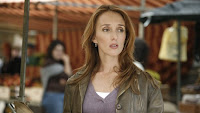 However, his arrival coincides with a series of vicious night-time attacks on the local farm animals and it isn't long before Santi finds himself under suspicion. Sadly, the film doesn't really live up to its premise and I lost interest way before the end. It's impressively acted and moderately atmospheric (the shady village is a nice idea), but it's never really scary or suspenseful. Still, there are some nice touches – Santi ends up going out with the only Goth in the village – and things liven up a bit with the arrival of Santi's best friend, but the denouement is disappointing and you immediately end up thinking of several better alternatives. Three stars.
However, his arrival coincides with a series of vicious night-time attacks on the local farm animals and it isn't long before Santi finds himself under suspicion. Sadly, the film doesn't really live up to its premise and I lost interest way before the end. It's impressively acted and moderately atmospheric (the shady village is a nice idea), but it's never really scary or suspenseful. Still, there are some nice touches – Santi ends up going out with the only Goth in the village – and things liven up a bit with the arrival of Santi's best friend, but the denouement is disappointing and you immediately end up thinking of several better alternatives. Three stars.The Cool World
Part of the Shirley Clarke retrospective, about a young man trying to gain some street cred by acquiring a gun.
 I probably shouldn't have gone to this, as I was quite tired and I ended up not enjoying it as much as I might have otherwise. After seeing The Connection the other night, I thought I knew what I was in for, but the style and content were completely different, in surprisingly modern ways - occasionally, it reminded me of watching the young black kids in The Wire. Set in the 1960s and adapted from a novel by Warren Miller, the film follows two black teenagers as they wander around the streets of Harlem, trying to get hold of a gun. The film often feels like a documentary, to the point where the dialogue is so naturalistic that it actually got quite boring to listen to. The film also has a great jazz soundtrack and features a brief appearance by the legendary Dizzy Gillespie. Unfortunately, my tiredness meant that I couldn't really engage with it and I was struggling to stay awake by the end, gun or no gun. Still, it was impressively photographed and Clarke gets impressively naturalistic performances from her two leads. It's a mystery that the film isn't better known, because it's easy to see that it's been hugely influential over the years. Three stars.
I probably shouldn't have gone to this, as I was quite tired and I ended up not enjoying it as much as I might have otherwise. After seeing The Connection the other night, I thought I knew what I was in for, but the style and content were completely different, in surprisingly modern ways - occasionally, it reminded me of watching the young black kids in The Wire. Set in the 1960s and adapted from a novel by Warren Miller, the film follows two black teenagers as they wander around the streets of Harlem, trying to get hold of a gun. The film often feels like a documentary, to the point where the dialogue is so naturalistic that it actually got quite boring to listen to. The film also has a great jazz soundtrack and features a brief appearance by the legendary Dizzy Gillespie. Unfortunately, my tiredness meant that I couldn't really engage with it and I was struggling to stay awake by the end, gun or no gun. Still, it was impressively photographed and Clarke gets impressively naturalistic performances from her two leads. It's a mystery that the film isn't better known, because it's easy to see that it's been hugely influential over the years. Three stars.

